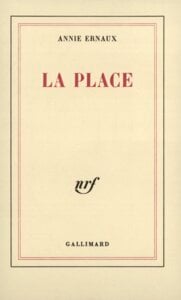Interested in reading a book by 2022 literature laureate Annie Ernaux but don’t know where to start? We asked three members of the literature committee at the Swedish Academy – who decide on the year’s Nobel Prize in Literature – to give us their recommendations.
Ellen Mattson on Happening (L’Événement)
I would happily recommend all Ernaux’s books, but a particular favourite is Happening (L’Événement) from 2000. It is an account of the illegal abortion Ernaux underwent in the early 1960s, the circumstances leading up to it and its devastating consequences. Given the chance to higher education and to lift herself out of the working-class milieu where she grew up, the young Annie realises that she must end the pregnancy. She just does not know how to do it. She seeks medical advice, tries the old methods of knitting needles etc., asks around for an address and manages finally to locate a backstreet abortionist.
What follows is a brutally realistic description of her ordeal, ending in a hospital where she nearly bleeds to death. But it is also a description of light, and alleviation, something near to ecstasy. It is as if this extreme situation and what she is going through connects her more strongly to life and to the future. This way of writing about something that has traditionally been considered shameful, low, and ugly makes L’Événement quite a remarkable book.
Anders Olsson on A Man’s Place (La place)

My choice is Annie Ernaux’s fourth book La place (1983), in English A Man’s Place. It was her literary breakthrough and has already become a classic in modern French letters. With this brief and unsentimental portrait of her father she takes her investigation of her simple Norman background in a new direction. It is not a regular work of fiction, but something in between literature, sociology and history, where the memory of her father is presented against the backdrop of his pressing life conditions. It is clear that she can only write this book from the other side of the class barrier, which she had to transgress in order to get her education and become a writer. The act to write is for her evidently an act of liberty but also an act of betrayal, and she uses Jean Genet’s words as the book’s epigraph: “to write is the last resort / having committed treason.” This makes her gaze double. She describes intimately and concretely what only she could have known about her father, but also his hard labour as a rural and then industrial worker, his habits, joys and manners of speech. Only with her double vision she can uncover the shame and humiliation that he is suffering from because of his class, his lack of education and self-esteem. It is thus in a wonderful way a book written both to restore her father’s dignity and to reveal the injustice behind his harsh life conditions. In its plain style, leaving much unsaid, it is in itself written as an act of solidarity with the father.
Anne Swärd on I Remain in Darkness (Je ne suis pas sortie de ma nuit)
I Remain in Darkness is the enigmatic title of one of the thinnest – but in my view also one of the most dense, poignant and vigorous – books of Annie Ernaux. It depicts the end of her mother’s life, those painful last years when the author saw this once so powerful mother of hers disappearing into the darkness called dementia. If you haven’t read Annie Ernaux before, this is probably not the first book you should pick up, rather the last. But it’s worthwhile waiting for.
In my case: first having read A Woman’s Story (Une Femme), the novel where we get to meet the same mother at the height of her “power” (an eccentric, expressive, demanding and loving woman; her background, upbringing and life) it’s quite shocking to follow her physical and mental decay in I Remain in Darkness. The topic is lightly touched upon in her other books, but here described in detail. It’s almost impossible, and very painful, to think that it’s actually the same person portrayed in those two books.
Moreover it’s fascinating that the writer manages to uncover – or, to be honest, quite ruthlessly expose – the vulnerability of her mother with such unsentimental respect, such dignity. I asked myself several times during the reading: “Is this really okay?” Sometimes the writer seems to cross the fine line between honesty and cruelty, and yet… she always manages to end up on the right side of this sharp edge. All because of love.
Book cover La Place © Francesca Mantovani – Éditions Gallimard, photo: Monica Mileur
First published October 2022